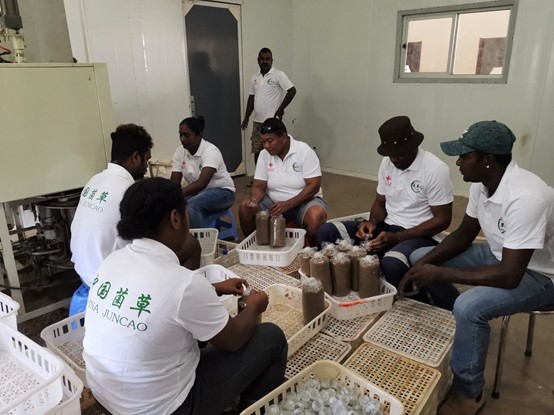
Employees working ata site featuring factories, laboratories, training classrooms, dormitories, and a cultivation area used for demonstration purposes known as theFiji Juncao Technology Demonstration Centerin Nadi, Fiji’s third largest city (Xinhua/Zhang Yongxing)
Demand has existed for mushrooms and other edible and medicinal fungi in the Pacific Island nation of Fiji, but it had been importing nearly 100% of those that it consumed prior to launching its own industry in late 2014, and prices were not favourable for consumers. The hot climate in the country had contributed to it being considered unsuited to the cultivation of the crops, and it was unable to reliably do so.
In 2014, the governments of China and Fiji signed an agricultural cooperation agreement, and the China-Fiji Juncao Technology Cooperation Project was launched. Juncao – a word transliterated from Chinese that literally means “fungus grass” and refers to a type of hybrid grass that can be used as a substrate for fungi, to control erosion and desertification, and as feed for livestock among other applications – was introduced, and the nation began receiving assistance with the initiation and development of its edible and medicinal fungi industry, leading to benefits such as diversified diets, new job opportunities, increased incomes for farmers, and poverty relief opportunities, especially in rural areas as edible fungi has become increasingly popular at local restaurants and supermarkets.
Logs or sawdust are traditionally used as substrate when growing fungi, but substituting mulched grass makes it possible to help conserve the modern world’s increasingly threatened woody plants and forests. Fujian Agriculture and Forestry University (FAFU) professor Lin Zhanxi originally developed the hybrid grass in China in the 1980s and is also the chief scientist involved with the China-Fiji Juncao Technology Cooperation Project, which mostly consists of technical cooperation and construction of a site featuring factories, laboratories, training classrooms, dormitories, and a cultivation area used for demonstration purposes known as the Fiji Juncao Technology Demonstration Center and has since been completed. The project made it possible for Fiji to commercialise its homegrown edible and medicinal fungi for the first time in late 2014.
Various extant problems had to be addressed prior to doing so, however, such as the fact that the groundwater in Fiji is too warm for the natural coolant to help mushrooms and other fungi grow properly, so the experts that have been involved began developing a set of solutions. They recommended digging holes in the ground around 40 cm deep in the shade of trees, placing bags of mulched Juncao and the right amount of spores in them, and covering the holes with a thin blanket of soil in order to protect the fungi from direct sunlight exposure and decrease high temperatures; regularly spraying water on the blanket of soil and covering it with film in order to counteract the dry air that exists in Fiji and retain moisture, and doing so in the coconut and mango forests that exist in the country, which are natural fungi fruiting environments, if fruiting chambers were not available.
Chinese experts helped Fijian farmers learn and apply the easy-to-understand, cost-effective methods and techniques and also helped Fiji build the Fiji Juncao Technology Demonstration Center. A cradle that nurtures Fiji’s Juncao and fungi industries, the modern facility includes a fungi production line with an annual capacity of 300 tonnes featuring a fungi incubation and fruiting system with automated light, temperature, and moisture controls, high-pressure sterilisers, automated mixers, bagging machines, and other advanced equipment.
A private school in Nadi, Fiji’s third largest city and where the Fiji Juncao Technology Demonstration Center locates in, provides a curriculum that prepares students for career opportunities and institutions of higher learning in addition to other benefits that serve them throughout their lives. Jeanette Crickett, a woman in her 70s who is the principal of the school, became interested in growing edible fungi on campus in order to stimulate students’ interest in this area and give them an opportunity to observe the undertaking and study it and increase their awareness of biology after visiting the facility in the spring of 2018. The school has been doing so ever since and sells the mushrooms and other fungi that it grows, which helps it cover various expenses.
As of June 2022, Lin’s team has trained 1,704 Fijians, including female farmers, persons with disabilities, and even tour managers who lost their jobs as a result of the COVID-19 pandemic and helped two villages become model edible and medicinal fungi cultivation villages and 45 technicians and officials from Fiji’s Ministry of Agriculture have received training at FAFU. The efforts have benefited poverty alleviation efforts in the island nation and promoted friendly relations between itself and China. One of Fiji’s major industries, tourism has been growing in Fiji as well and has a symbiotic relationship with the industry. Mushrooms and other edible fungi are often served at its restaurants and hotels, which it is now able to produce itself. Fungi prices have decreased considerably in the nation, and it even intends to begin exporting edible and medicinal fungi in the future.
Category
China Helps Fiji Launch its Edible and Medicinal Fungi Industry Using Special Hybrid Grass Substrate
Contributor
China Helps Fiji Launch its Edible and Medicinal Fungi Industry Using Special Hybrid Grass Substrate
Country
Story

